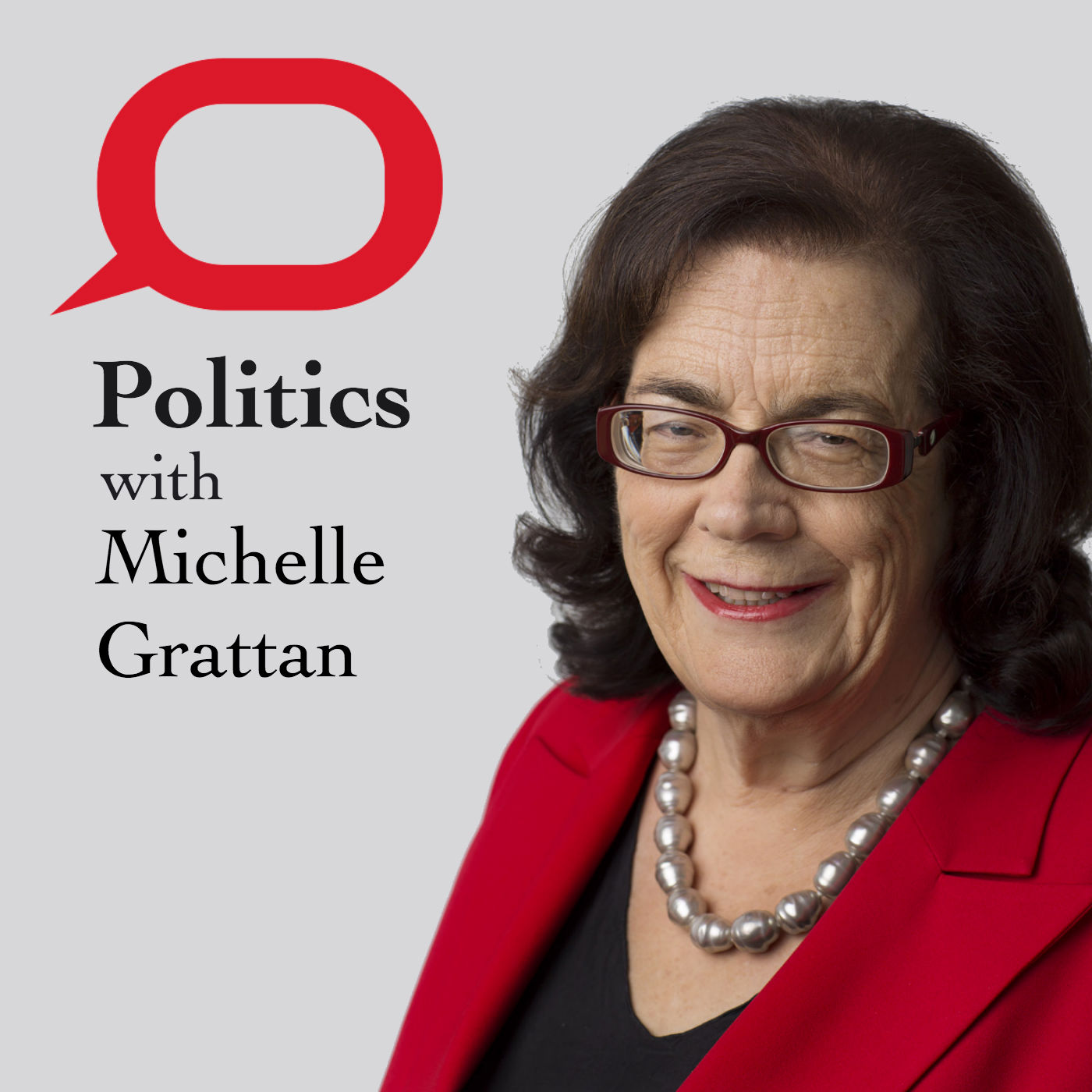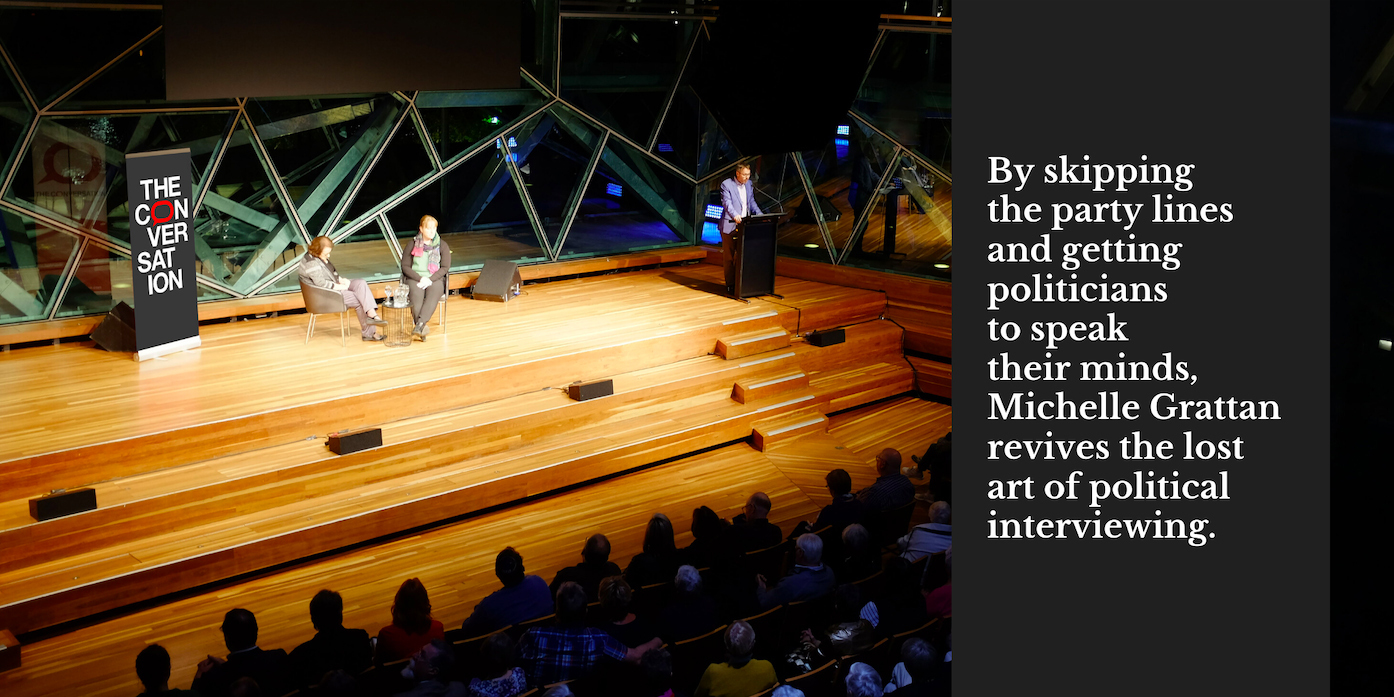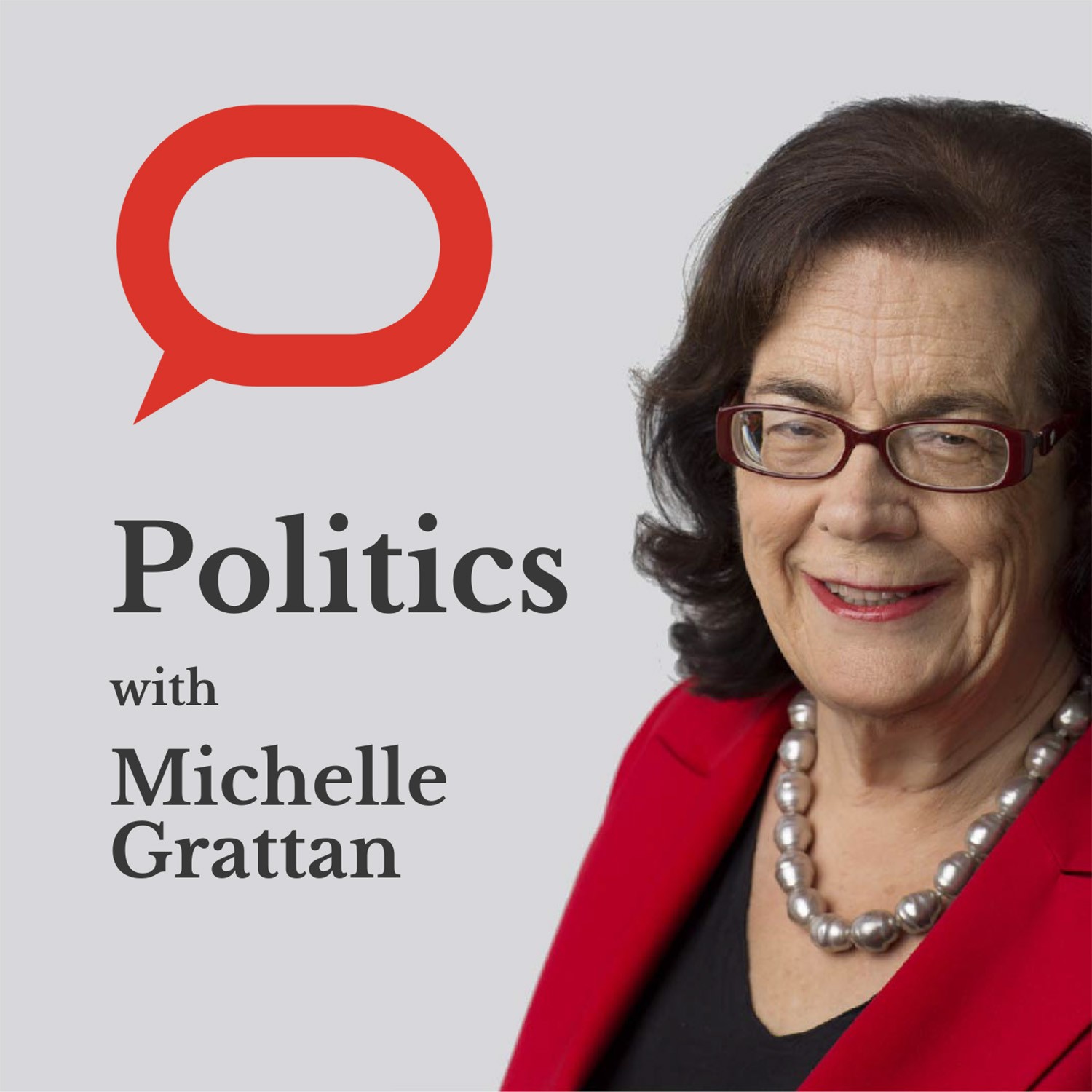Episodes

Thursday Dec 15, 2016
Politics podcast: Chris Richardson on the state of the Australian economy
Thursday Dec 15, 2016
Thursday Dec 15, 2016
Ahead of next week’s mid-year economic and fiscal outlook, the government has been hit with the sobering news that real GDP shrank in the September quarter. Deloitte Access Economics’ Chris Richardson offers some context to the gloomy figures.
“Perhaps a better way to describe it is the numbers have been artificially good for a while and now they’re looking artificially bad. The bottom line is that for four years now, Australia’s economy has been growing just a little bit below trend and that’s partly because the boom in China has peaked. China has slowed and that is throwing some challenges our way.”
Richardson tells Michelle Grattan he sees a lot that is missing from the debate about how to strengthen the economy and the budget.
“If you asked the person in the street - they’re aware that there are challenges but they don’t really know what they are and that worries me because getting good policies requires a good understanding from the electorate,” Richardson says.
Richardson foresees minimal immediate consequences if credit ratings agencies downgrade Australia’s triple A credit rating in the near future.
“In the short term, it is absolutely not a big deal. … Part of the reason why interest rates are very, very low is that investors are very, very scared and they want to put their money in super safe places and lending your money to the Australian government is still a remarkably safe thing to do right now.
"So yes, there would be a minor impact on the borrowing costs of the Australian government. I cannot get excited about that in the near term.”

Wednesday Dec 07, 2016
Nick Xenophon on working the new parliament
Wednesday Dec 07, 2016
Wednesday Dec 07, 2016
As the curtain falls on the year, one of the most powerful players in the new parliament looks back on his successes. Nick Xenophon nominates whistleblower protections and procurement law changes negotiated alongside the government’s industrial legislation as major achievements.
“The government has agreed to sweeping changes to whistleblower protections in this country. Compensation for whistleblowers will be built into the registered organisations legislation that will apply to unions and employer organisations but most importantly it will also apply to corporations and to the public sector in the next 18 months and we’ve already begun the process on that.
"The other big achievement, just a few days ago was with the ABCC legislation. The government has agreed to procurement law changes which will mean for the first time we’re more in line with some of our major trading partners,” Xenophon says.
Xenophon tells Michelle Grattan that his team will have hard negotiations with the government “but we like to think that if we reach a consensus, a compromise, we do so in good faith which I think is mutually beneficial to both parties”.
“I think the government can expect more of the same and I think the government is prepared to sit down and talk to us about areas of common ground.”
Reflecting on One Nation, Xenophon describes the relationship between his and Pauline Hanson’s teams as “courteous”.
“Even though I made it clear that I don’t agree with them on their views on immigration, on race, on religion. Attacking Islam is not what we do. We think we are a multicultural society and tolerance is the key and obviously we have very different views on climate change. But where there’s common ground - such as issues on procurement, on Australian jobs, on food labelling, on farmers getting a fair go - obviously where there’s common ground we’ll work together.

Wednesday Nov 30, 2016
Josh Frydenberg on climate change and the 2017 review
Wednesday Nov 30, 2016
Wednesday Nov 30, 2016
After ratifying the Paris agreement on climate change, the government is looking ahead to its 2017 review of climate change policy. Energy and Environment Minister Josh Frydenberg tells Michelle Grattan the government will have more to say about the review before Christmas.
“The key is to ensure we’re on track to meet our 2030 targets, which is a 26-28% reduction in our emissions by 2030 on 2005 levels. We did beat our first Kyoto target by 128 million and we’re on track to beat our 2020 target by 78 million tonnes. But clearly the 2030 target is a larger one and a more challenging one,” Frydenberg says.
“We’ve got some good mechanisms in place but we’ll be looking at the overall settings to ensure we meet our Paris commitments.”
With some in the Coalition rattled by the growing popularity of One Nation, Frydenberg says: “The way to deal with it is to listen and to understand people’s concerns as to why they have left some of the major parties and to take action to ensure that they understand the good things that the government is doing.”
Music credit: “Where the river run”, by Ketsa on the Free Music Archive

Thursday Nov 24, 2016
Jenny Macklin on Labor’s approach to welfare
Thursday Nov 24, 2016
Thursday Nov 24, 2016
In times of budgetary constraint, the cost of Australia’s welfare system has been regarded by many in the Coalition as a burden and a drag on economic growth. Shadow Minister for Social Services and Families Jenny Macklin has a different take.
“Sadly I think the Liberal-National Coalition have an ideological view that the welfare system is too generous - even though the international evidence is completely to the contrary…our social security system is one of the most tightly targeted in the world,” she says.
For Labor, the message is that cuts to welfare and social services increases inequality - damaging the wider economy.
“You’ve got the International Monetary Fund, the OECD, other very big international players telling us that increasing inequality is a constraint on growth. So what Labor is saying is that we want to… use all the different levers available to us to reduce inequality through the tax changes on negative gearing for example, through improved social investments, such as our schools policy.
"These are all very practical policies that Labor has to reduce inequality, to make sure that we see that reduction in inequality delivering in improved economic growth.”
Music credit: “Dryness”, by Ketsa on the Free Music Archive.

Wednesday Nov 23, 2016
Barnaby Joyce on the state of the National Party
Wednesday Nov 23, 2016
Wednesday Nov 23, 2016
Earlier this week, footage aired of Attorney-General George Brandis speculating that Queensland’s Liberal National Party might demerge. But Nationals leader and Deputy Prime Minister Barnaby Joyce says this won’t happen.
“It’s not going to happen. You know why? Because the people who make that decision is not George, or myself or anybody else, it’s the membership and the membership would have to decide they want to do it and I haven’t heard any big swathes of members having meetings saying that want to demerge.”
Joyce tells Michelle Grattan the Nationals need to differentiate themselves from the Liberals.
“I think people clearly understand there’s a difference between the National Party and the Liberal Party. They recognise the qualities in both. If there wasn’t a reason to differentiate then you would amalgamate. So I’m very - always have been - parochially National.
"When I first came into politics back in 2005 and we got down to 12 members and senators I think, there was always this ‘oh we should just fold this show up’ and I fought as hard as I could with others to make sure that didn’t happen,” Joyce says.
Acknowledging the threat posed by One Nation, Joyce puts that party’s success into the context of a global wave of right-wing populism.
“In those messages are things that matter to people - are messages that matter, that resonate. People wouldn’t just change [their vote] because they got a giggle. They change because they get a message and go ‘yep, that’s all I needed to know and that’s enough for me to change my vote’. And that’s what’s happening now and we’ve got to compete in that space.”
Joyce also has a reality-check for his colleagues pushing for changes to section 18C of the Racial Discrimination Act.
“There’s a set of people who are more intensely involved in politics and they might be concerned - but if you think I go past the guys working on the road and as I say ‘g'day’ to them and ask them how’s the job going [that] they’d say ‘I really want to talk to you about 18C’ - no they don’t.
"They are interested in the things they can touch. They do not occupy themselves in the deeper philosophical thoughts.
"What we’ve got to be really careful of is once you leave the party room meeting - whether it’s here or whether it’s your branch meeting back in the country - don’t think that’s the issue that’s going to get across to people in the pub on a Friday night.”
Music credit: “What tomorrow brings”, by Ketsa on the Free Music Archive

Wednesday Nov 16, 2016
Rory Medcalf on the security implications of Donald Trump’s presidency
Wednesday Nov 16, 2016
Wednesday Nov 16, 2016
For allies of the United States, the reality of a Donald Trump presidency has just begun to sink in. Former Australian diplomat and intelligence analyst, Professor Rory Medcalf, who heads the National Security College at ANU, tells Michelle Grattan that for Australia, the shock of the Trump presidency will mean that we have to think much more seriously about what our foreign policy and national security looks like with an unpredictable American ally.
“I do think that Australia knows now that we can’t simply rely on the strategic direction that America is setting in the Asia-Pacific or the Indo-Pacific region, because I suspect under Trump, for quite a while, the Americans won’t know that themselves,” he says.
“A lot of old certainties are now in question. I think that countries like China and Russia are going to feel emboldened, particularly Russia. I think US allies around the world are going to be feeling anxious and there is this potential for a ripple effect of far-right political views, more so in Europe than in this country.”
Music credit: “Sabre”, by Ketsa on the Free Music Archive

Tuesday Nov 08, 2016
Julian Leeser on section 18C of the Racial Discrimination Act
Tuesday Nov 08, 2016
Tuesday Nov 08, 2016
Many in the government have clamoured for changes to be made to section 18C of the Racial Discrimination Act. Liberal backbencher Julian Leeser, however is not one of them.
The member for the northern Sydney seat of Berowra tells Michelle Grattan there are definitely people within the Liberal Party who share his view that Section 18C “achieves a good balance between allowing people the freedom of speech which is necessary in a democracy like Australia but also protecting racial minorities from racial vilification and racial slurs”.
“But the thing that I think unites everybody in this debate, regardless of your view on Section 18C, is that the process underscored in the QUT case and also in the Bill Leak case, just didn’t work as well as it should have,” Leeser says.

Thursday Nov 03, 2016
Kim Beazley on the US election
Thursday Nov 03, 2016
Thursday Nov 03, 2016
Kim Beazley’s time as Australia’s ambassador to the United States came to an end earlier this year, but he is riveted by next week’s presidential election.
“When I was the ambassador to Washington I just missed politics every day. In this year, I am missing the United States every day,” he says.
Beazley tells Michelle Grattan that “slightly, on balance” Hillary Clinton is more likely to win. “But the anger, the energy, in this campaign is within one group and that is with the white working class - mainly male but also female - who feel that America is being taken away from them,” he says.
“I see the election contest at the moment has the momentum with Trump.”
He cites the reduced turnout of Democrat-voting African-Americans and the mire of the Hillary Clinton email controversy as factors in a possible upset.
“One would have to say that if there is more of this over the weekend that the Trump momentum may well be unstoppable.”
If Trump pulls off an unlikely victory, Beazley foresees huge challenges for Australia. “Were he to implement the policies that he talks about in regards to the Asian region, we would be confronting strategic damage and possibly economic disaster,” he says.
Beazley says Hillary Clinton has a very favourable view towards Australia. “She sees us as a skilled, well-off and purposeful people and she will have things for our will and purpose and a lot of them may well involve decisions or topics that we’re quite uncomfortable with.”
“I think for starters she would be looking very strongly at a deeper integration of Australian and American forces in the region. She might be looking more vigorously than Obama has been at deployment of American aircraft from Australian bases and she’d in all probability look quite strongly at the possibility of rotating ships through [Royal Australian Navy base] Stirling.”
Music credit: “Star-spangled banner” by the United States Marine Band on the Free Music Archive

Wednesday Oct 26, 2016
John Blaxland on The Secret Cold War - The Official History of ASIO
Wednesday Oct 26, 2016
Wednesday Oct 26, 2016
In the third volume of The Official History of ASIO series, historians Dr John Blaxland and Dr Rhys Crawley examine the organisation’s role in the years leading to the end of the Cold War.
Blaxland tells Michelle Grattan that this is a story about looking at Australia in the ‘70s and '80s “through the glasses of an ASIO officer or an ASIO agent”.
During the period covered in the book, Blaxland says the Soviet Union was so active in Australia the work of ASIO was not sufficient to cover their activity.
“Effectively, ASIO found itself dealing with a grown Soviet presence and a proliferation of Soviet Bloc consulates and diplomatic presences that were simply beyond it. They weren’t resourced to monitor them all. And so we now know that while ASIO was doing what it could, it was in a position where it was simply outpaced. They did not have the number of officers and agents in place to monitor the incredible growth in the number of diplomats-cum-spies operating in Canberra, Sydney, Melbourne and elsewhere,” he says.
In this final volume, which was preceded by The Protest Years and The Spy Catchers, Blaxland and Crawley draw upon ASIO archives and interviews with former spies to piece together a history of one of Australia’s most secretive institutions.
Music credit: “The Spirit of Russian Love” by Zinaida Troika, covered by Kosta on the Free Music Archive.

Tuesday Oct 18, 2016
Stirling Griff and Skye Kakoschke-Moore on life in the Senate
Tuesday Oct 18, 2016
Tuesday Oct 18, 2016
Nick Xenophon’s two new Senate colleagues, Stirling Griff and Skye Kakoschke-Moore, are no strangers to the political process, having both worked with Xenophon behind the scenes.
In a joint interview, they tell Michelle Grattan about their contrasting experiences in becoming politicians. Kakoschke-Moore says she has had the benefit of being around Xenophon for nearly six years. “So I understand the way he operates,” she says.
Working as a Xenophon adviser, she learnt the ropes of the Senate. “It is so rule-driven and so procedure-driven that I have a great deal of sympathy for people coming into this who have had no exposure at all to the inner workings of Senate procedure.”
Stirling Griff, on the other hand, has had a “huge learning curve”.
“I’m following behind Skye like she’s the mother hen and I imagine I’ll be doing that really for another few more weeks,” he says.
With the government’s industrial relations legislation before the parliament, the Nick Xenophon Team is looking for some amendments.
“Particularly in relation to the building code and requiring building projects, to the greatest extent possible, to use Australian goods and services. So we’ll be looking at the bills closely but we’ll also be keeping an open mind to amendments,” Kakoschke-Moore says.
The pair are dismissive of any move by senator David Leyonhjelm to push for concessions on gun laws in exchange for passage of the industrial relations bills.
“They’re not related and we don’t want to play those games,” Griff says.

